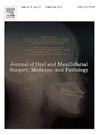66例晚期口腔鳞状细胞癌颈部淋巴结转移患者行逆行超选择性动脉灌注热放化疗的回顾性研究
IF 0.4
Q4 DENTISTRY, ORAL SURGERY & MEDICINE
Journal of Oral and Maxillofacial Surgery Medicine and Pathology
Pub Date : 2025-06-04
DOI:10.1016/j.ajoms.2025.06.003
引用次数: 0
摘要
目的对66例口腔鳞状细胞癌患者进行回顾性研究,分析转移性淋巴结逆行超选择动脉内放化疗联合热疗的预后及治疗相关不良事件。方法采用颞浅动脉和枕浅动脉插管。治疗方案为超选择性动脉内化疗(多西紫杉醇,60 mg/m2;顺铂,150 mg/m2),每日同步放疗(60 Gy)联合热疗,持续6周。放化疗期间热疗每周一次或两次,持续50 min。结果3年局部控制率为82 %,总生存率为78 %。治疗相关不良事件包括97% %的患者发生3级和4级口腔黏膜炎,50% %的患者发生放射性皮炎,59% %的患者发生1级和2级颈部皮肤烧伤。结论该联合疗法治疗晚期口腔癌伴淋巴结转移患者疗效良好。本文章由计算机程序翻译,如有差异,请以英文原文为准。
Thermochemoradiation therapy using retrograde superselective intra-arterial infusion for patients with cervical lymph node metastases from advanced oral squamous cell carcinoma: A retrospective study of 66 cases
Objective
A retrospective study of 66 patients with oral squamous cell carcinoma was conducted, focusing on the outcomes and treatment-related adverse events of retrograde superselective intra-arterial chemoradiotherapy combined with hyperthermia on metastatic lymph nodes.
Methods
The superficial temporal and occipital arteries were catheterized. The treatment consisted of superselective intra-arterial chemotherapy (docetaxel, 60 mg/m2; cisplatin, 150 mg/m2) and daily concurrent radiotherapy (60 Gy) combined with hyperthermia for 6 weeks. Hyperthermia was induced once or twice weekly for 50 min during chemoradiotherapy.
Results
The 3-year locoregional control and overall survival rates were 82 % and 78 %, respectively. Treatment-related adverse events included grade 3 and 4 oral mucositis in 97 % of patients, radiation dermatitis in 50 %, and grade 1 and 2 neck skin burns in 59 % of patients.
Conclusions
This combination therapy has led to good outcomes in patients with advanced oral cancer and lymph node metastases.
求助全文
通过发布文献求助,成功后即可免费获取论文全文。
去求助
来源期刊

Journal of Oral and Maxillofacial Surgery Medicine and Pathology
DENTISTRY, ORAL SURGERY & MEDICINE-
CiteScore
0.80
自引率
0.00%
发文量
129
审稿时长
83 days
 求助内容:
求助内容: 应助结果提醒方式:
应助结果提醒方式:


